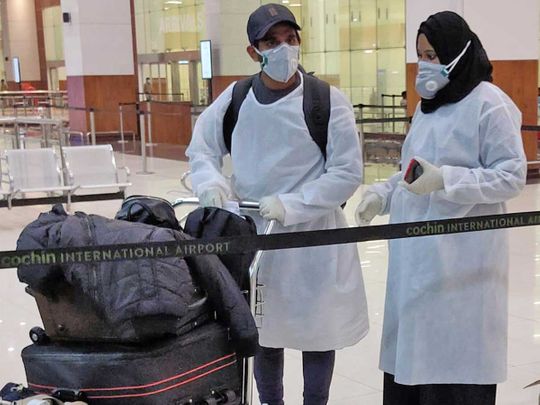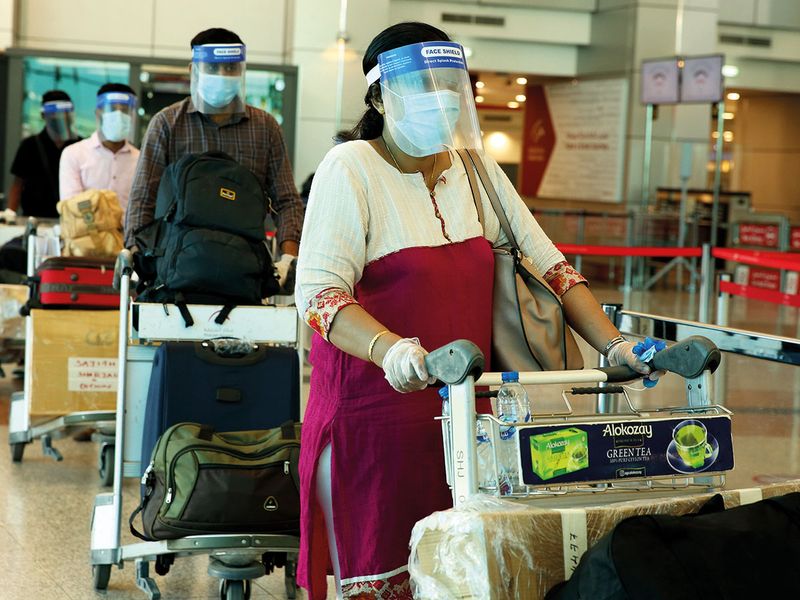
Thiruvananthapuram: Amid the gloomy days of coronavirus, Keralites stranded in various Gulf countries experience some sunshine when they manage to get an air ticket home, to be reunited with families. There is also the added comfort of statistics that say the state has had less than three dozen deaths so far.
But the ground reality is quite different for many when they do get home. Far from the soothing perceptions of a happy reunion with family and neighbours, a caring government, and a likely stable livelihood in their home state, there are challenges awaiting the returnees, going by experiences of those who have reached home.
Trouble begins at the airport
Social media is abuzz with videos of returning Keralites facing confusion at airports, having to spend hours before being let out of the airport, and also facing contradicting directives of where and how long to spend their quarantine periods.
“The journey home was agonising. We started from Muscat on a Sunday, landed at the Kannur airport that evening and could reach home only by Monday evening. I can now forget that tortuous journey only because of being glad of reaching home,” Anish Kumar from Erumely in Kottayam district who returned home last month told Gulf News. Kumar was employed by a steel fabrication company in Oman.
The delay in reaching home meant Kumar could not meet his wife Soya, a nurse, who had to leave for Munnar on duty even as Kumar was on a bus from Kannur to his home, to begin a fortnight’s quarantine.

Tough times ahead
Kumar has been working in Oman for about 18 years, and has experienced what life is like in Kerala when he was in the state briefly between jobs in Oman.
“Every person who has returned from the Gulf is seen in a different light and branded with the ‘Gulf-returnee’ tag. It is tough for returnees in all professions. I found it tough to get work, and even banks are reluctant to lend to returnees. Besides, there are many who are out to fleece us, trying to make a quick buck from returnees”, says Kumar.
“There is also the misconception that Gulf returnees are all rich. People here cannot imagine how I spent the last three months, surviving on meagre food supplies before being able to get a ticket home on a chartered flight,” says Kumar who is saddled with a Rs500,000 loan that was availed to build his house.
Kumar does not foresee bright days ahead for himself in the state, and is hoping that the situation improves in the Gulf and he can return.
Never been easy
“It is not about the COVID-19 times, but coming back from the Gulf has always been a difficult proposition,” according to Mahesh Mathew, a communications professional who returned a few years ago from Doha after a decade and a half in Qatar.
“A major problem for those who have been in the Gulf for two or more decades is that they are unlikely to have had any experience working in India. So when they return, they find it near impossible to adjust to the work culture,” says Mathew.
He pinpoints three areas of difficulty that many middle-aged Gulf returnees to Kerala find themselves in – outstanding loans, children who are yet to settle down in life, and a lack of work experience in India.
Mathew feels people in vocations like plumbing, electrical wiring or masonry may easily manage to find jobs back home but it would be a struggle for most office or clerical staff.
Not just the cash, the lifestyle, too
Xavier George, who has worked six years each in Manama and Dubai in multiple sectors and returned to Kerala some years ago, feels one good thing about working in the Gulf is that it gives you a healthy work schedule as well as a peaceful life, in contrast to the social tensions one experiences while living in Kerala with the extended family and social circles.
“The environment here in Kerala kind of makes of one lazy without a proper schedule, particularly if you are not employed. Of course, a lot depends on each person’s domestic circumstances, too”, he says.
“If you return from the Gulf, come back with a healthy bank balance,” is George’s advice to returnees. He feels 60 per cent of those who return during the COVID-19 period will try and get back to the Gulf once the pandemic subsides because “there are just aren’t enough job openings here”.
This time is different
There have been turbulences in the Gulf job markets before and Keralites have briefly returned home before finding work in the Gulf again, but Abu Dhabi-based Kerala businessman Varghese Joseph feels this time is different.
“There are two things that are drastically different this time. One, even neighbours want to stay away from NRIs for fear of contracting COVID-19. We are virtually ostracised. Secondly, there is no financial help to expect from friends or family, both because they have no money to lend and because it is difficult to convince people about rebuilding lives in the Gulf,” says Joseph.
Joseph says it hurts to see how people in Kerala are avoiding returnees like the plague. “Local residents are even blocking the fish monger, the milkman and the newspaper vendor from delivering at my home,” he says.
What next?
Like many others who made wealth in the Gulf and tried setting up business in Kerala, Joseph too considered setting up an enterprise in Kerala but developed cold feet seeing the maze of rules and the complications with regard to permissions and labour management.
“Only about 10 per cent of Keralites in the Gulf are well off. The situation of many others is now pathetic”, says Joseph. But he feels those who return will again look to the Gulf for fresh jobs and rebuilding their lives.
Sitting at his home in Erumely, Anish Kumar is also hopeful that he’ll be able to find another job in the Gulf to pay off his remaining debt.
Without a doubt, the present downturn is hurting millions of Keralites. For a significant number of them, a Gulf lifeline continues to be the preferred way out of their present financial crater.
(Some names have been changed on request)








